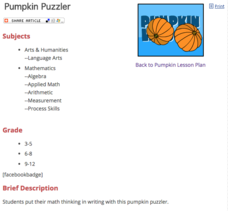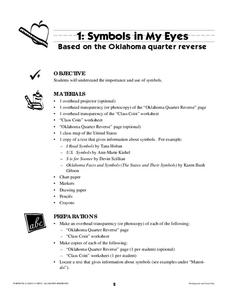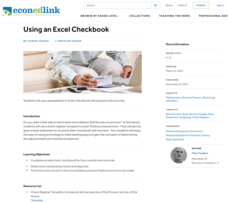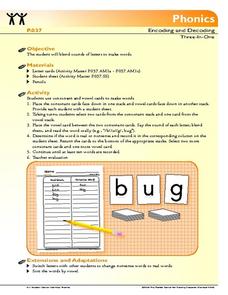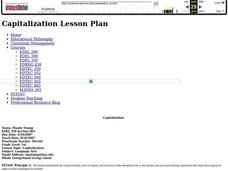Education World
Pumpkin Puzzler
Light the Halloween festivities with an exercise that connects math, physical science, and language arts. After watching a demonstration of a burning candle, learners use division, multiplication, or algebra to determine how many boxes...
Scholastic
Soccer Balls
Add some variety to your teaching of two-digit multiplication with this fun skills practice exercise. Presented with a geometric design of six soccer balls each with two-digit multiplication problems written inside of...
US Mint
Symbols in My Eyes
Explore the hidden meanings behind the images on US currency with this elementary school lesson on symbolism. Starting with a class discussion about symbols, children go on to brainstorm different objects that represent the Unites...
US Mint
Coin Connections
Help young mathematicians make cents out of the US currency system with this two-part math lesson. Children first learn the names and values for each type of coin, before learning to count and compare the values of coins using the...
US Mint
Desert Dwellers
What can a quarter possibly teach young learners about desert ecosystems? More than you might think. After displaying and discussing the included picture of the Arizona state quarter, the class participates in a series of...
US Mint
Rename That State!
As Shakespeare famously wrote, "A rose by any other name would smell as sweet," but can the same be said for a state? In this elementary geography lesson plan, students are assigned specific states to research using the...
Council for Economic Education
Using an Excel Checkbook
High school is the time that many scholars get their first jobs. Help young entrepreneurs apply economic principles to crucial skills for their new jobs and for functioning in society in general. They use Excel to balance a checkbook by...
Council for Economic Education
Production Possibilities Curve
Demonstrate the important economic principles of the production possibilities curve, including how to calculate opportunity cost and graph curves by using a table or calculation. Learners use a variety of methods, including videos,...
Curated OER
Human Cloning: Is it Biological Plagiarism?
Is cloning good or harmful? Help your class understand the risks and benefits as they read, research, and discuss human cloning. Individuals form teams, research information, and present to the class before concluding with an in-depth...
Nancy N. Boyles
Summary Frame for Story Text and Informational Text
Provide these templates as aids for pupils as they work to compose summaries of both stories and informational texts. The first two frames provide sentence starters to help learners structure their summaries and include all the necessary...
Florida Center for Reading Research
Phonics: Encoding and Decoding, Three-In-One
Scholars use the provided pack of alphabet cards to construct basic CVC words, then write down each word they make in one of two columns. Column one is for real words and column two is for nonsense words.
For the Teachers
Cause and Effect Matrix
Study cause and effect in both literature and informational text with a lesson designed for several different reading levels. After kids review the concept of cause and effect, they read an article or story and note the causes and...
August House
How Tiger Got His Stripes
How did the tiger get its stripes? Kindergartners read a Vietnamese folk tale, "How the Tiger Got His Stripes," retold by Rob Cleveland, and work through several reading comprehension and literary analysis activities.
August House
Anansi Goes To Lunch - First Grade
Greed is the theme of this collection of multidisciplinary activities. As a class, read The West African folktale, Anansi Goes to Lunch by Bobby Norfolk, and take part in a grand discussion about it's plot and theme. Reinforce the...
August House
The Magic Pot
The Magic Pot by Patricia Coombs is the theme of this multidisciplinary lesson plan. Early readers first take part in a read aloud and grand conversation about the story's details. Then, they get to work practicing their skills in...
Curated OER
The True Confessions of Charlotte Doyle: KWHL
After completing the 11th chapter of The True Confessions of Charlotte Doyle by Avi, take part in a KWHL chart driven by the question,When is it appropriate and admirable to defy authority? Focusing on codes of conduct,...
Teach Engineering
Fluid Power Basics
What can bulldozers and screen doors have in common? Use this lesson plan on fluid power to find out. It begins with some simple teacher demonstrations, includes a couple of videos, and culminates with an inquiry-based activity to...
McGraw Hill
Study Guide for Island of the Blue Dolphins
Dive your class into a reading of Island of the Blue Dolphins with this in-depth study guide. Breaking the novel into three parts, the resource begins each section with a focus activity that identifies a specific theme or question...
Scholastic
Study Jams! Scientific Methods
Middle school scientists learn the steps of the scientific method by watching this phenomenal film and by singing a karaoke song! They are introduced to making observations and hypotheses, determining variables, data collection, and...
Curated OER
Capitalization
Teach your class the rules of capitalization with this fun, engaging activity. Children participate in a learning activity, collaborate with peers, and practice their writing as they learn three specific rules: to always capitalize the...
California Academy of Science
Tropical Belt
Where in the world is the equator? Explore a world map with your class, coloring in oceans, continents, and rainforests while locating the three major lines of latitude: the equator, Tropic of Cancer, and Tropic of Capricorn. Discuss how...
Scholastic
Study Jams! Proportions
Join Zoe and Sam as they use proportions to budget money for their Green Earth Club. Watch as they set up and solve a series of proportions using cross multiplication and division. A great resource that brings together prior knowledge of...
mdk12.org
Primary Source Quadrant Cards
Young historians can use this simple graphic organizer to define primary source and list both examples and non-examples of the term. A similar resource can also be constructed for secondary sources!
United Learning
The Great Age of Exploration (1400-1550)
Delve into the Age of Exploration with this activity-packed resource! Complete with a pre-test, discussion questions and quiz for a 30-minute video on the period, map activities, timeline of discoveries, vocabulary, etc. this is a...
Other popular searches
- Cellular Differentiation
- Cell Differentiation
- Implicit Differentiation
- Genetic Differentiation
- Differentiation and Math
- Anti Differentiation
- Differentiation Strategies
- Differentiation Rule
- Differentiation Lesson Plans
- Logarithmic Differentiation
- Differentiation Component
- Writing Differentiation
